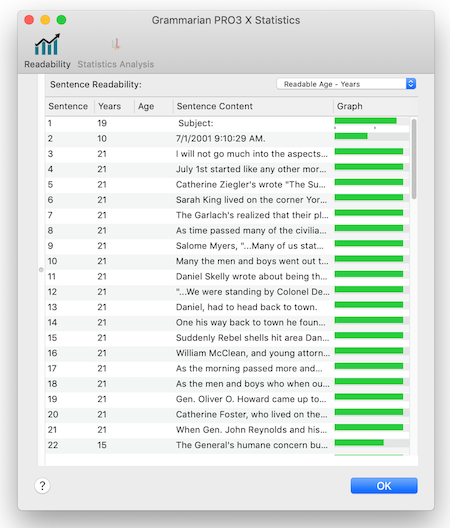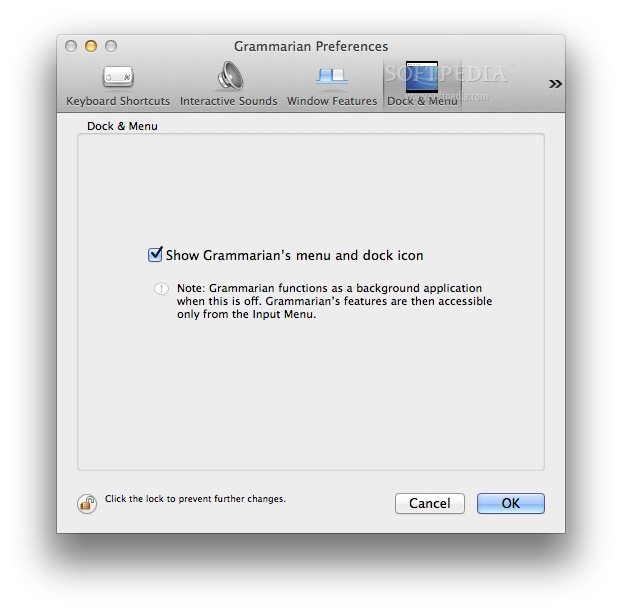

But the relative pronoun is serving as a subject here, of the verb "was," so "who" is required. Garner gives this example: "Many people criticized him for fraternizing with a man whom they thought was the enemy." Like the confusion in Quammen's sentence, this error is caused by proximity - in this case, of the relative pronoun ("who" or "whom") to another pronoun ("they"), which often signals the objective case: "He was a man whom they thought the enemy" would be correct.
#Grammarian pro windows professional
The nominative "whom" trips up even many professional writers. This fascist is most nonplussed by the more abstruse solecisms - often ones, make of this what you will, involving subject and object confusion. I say "Who are you talking to?" And when the Clash sing "exactly whom I'm supposed to be," I cringe.īut there is also a fascist inside me, and he cannot abide a person who says "between him and I" - that is, someone who goes out of his way to get it wrong (I'm OK with "Let us go then, you and I," but that's a special case). I don't care if someone uses "ain't" or double negatives.

He explains that he justifies his insistence that "certain black students" learn the rudiments of Standard Written English by telling them that they're studying a foreign dialect, one whose mastery will be expected of them and will be one of several yardsticks by which they are unfairly judged.įair enough, but was this why Wallace himself used standard English? He was dedicated to the project of changing the elitist political realities of American language? Me, I can see the appeal of loosening standards in the name of a democratically minded anti-elitism. Wallace knows that too strict a concern for "proper" usage contains some ugly implications, which can land a writer in hot water (consider the lobster). David Foster Wallace reviewed the first edition for Harper's and expanded that review into one of his most entertaining and most obnoxiously footnote-laden essays for "Consider the Lobster" (2006). Garner's "A Dictionary of Modern American Usage" (now in its third edition and retitled "Garner's Modern American Usage," which yields the unfortunate construction "Garner's 'Garner's Modern American Usage'"). "The world will little note, nor long remember what we say here" is not a sentiment that would occur to a whale, nor is a whale likely to appreciate the irony of that sentiment's being carried by such extraordinary cadence. They do not keep records of their most gifted and profound singers. Whales might sing for the sheer pleasure of it - I suspect and hope they do - but they do not write novels or constitutions or laws or books about whalesong. But surely human language is in important ways not analogous to whalesong and monkey cries. Point taken: We're animals, and language is a biological function as well as a cultural tool. The plural noun "things" requires a plural verb: "make." "One" jumps over the prepositional phrase to connect with the verb "is"later in the sentence.

If you rephrase Quammen's sentence, it's easy to see why, logically, a plural verb should follow "that": "Of the things that make influenza so problematic, its propensity to change is one." (Of course the noun doesn't have to be "things.") The "one" is throwing off Quammen (and the billion other writers I've catalogued who make this error). "One of the things that" followed by a singular verb is one of the things that drive me crazy.
#Grammarian pro windows manuals
But I was dismayed to discover, on page 506, this sentence: "One of the things that makes influenza so problematic, Webster said, is its propensity to change." If you're unoffended by that construction, or have no idea what's wrong with it, you're probably less obsessed with usage manuals than I am. I recently read David Quammen's "Spillover," a scary, brilliant book about zoonotic diseases.


 0 kommentar(er)
0 kommentar(er)
